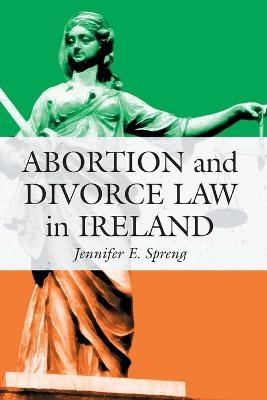
Abortion and Divorce Law in Ireland
Seiten
2003
McFarland & Co Inc (Verlag)
978-0-7864-1675-2 (ISBN)
McFarland & Co Inc (Verlag)
978-0-7864-1675-2 (ISBN)
This work examines Irish abortion and divorce law in their historical, religious and cultural contexts. Its main focus is on the referenda and court cases of the 1980s and 1990s, with attention given to their beginnings and their potential long-term effects on the communitarian Irish culture.
In 1991, the people of Ireland elected Mary Robinson, a women's rights crusader who supported legalized birth control and divorce, as their president. The country seemed poised for massive social and legal change, but it became apparent that even though Ireland at the dawn of the 21st century would be very different from the Ireland of the past, many fundamentals would remain the same.
This book examines Irish abortion and divorce law in their historical, religious, and cultural contexts. Its main focus is on the well-publicized referenda and court cases of the 1980s and 1990s, with special attention given to their roots and potential long-term effects on the communitarian Irish culture and opportunities for Irish women. The author identifies and discusses three forces that have affected Irish law and mores, especially those relating to abortion and divorce: economic insecurity; a sense of group loyalty and identification, particularly within families and churches; and Catholic teaching about the common good.
In 1991, the people of Ireland elected Mary Robinson, a women's rights crusader who supported legalized birth control and divorce, as their president. The country seemed poised for massive social and legal change, but it became apparent that even though Ireland at the dawn of the 21st century would be very different from the Ireland of the past, many fundamentals would remain the same.
This book examines Irish abortion and divorce law in their historical, religious, and cultural contexts. Its main focus is on the well-publicized referenda and court cases of the 1980s and 1990s, with special attention given to their roots and potential long-term effects on the communitarian Irish culture and opportunities for Irish women. The author identifies and discusses three forces that have affected Irish law and mores, especially those relating to abortion and divorce: economic insecurity; a sense of group loyalty and identification, particularly within families and churches; and Catholic teaching about the common good.
Jennifer E. Spreng, an assistant professor of law, teaches constitutional law at Phoenix School of Law in Phoenix, Arizona.
Acknowledgments
Preface
PART I
1. After the "Coffee and Condoms Revolution": Communitarianism in 21st Century Irish Law
2. "The Land of Happy Wars and Sad Love Songs"
3. The de Valera Vision: The Irish Constitution
4. What Kind of Country? Social Change from 1950 to 1980
PART II
5. The 1980s and the Rise of Modern Abortion and Divorce Law
6. The Equal Right to Life of the Mother
7. The Lone Irish Rights Bearer of the 1990s
8. On Tara Road: Women and Flourishing
9. Keeping Their Rough Edges: Constitutional Consent in Ireland
10. Conclusion
Chapter Notes
Bibliography
Index
| Erscheint lt. Verlag | 8.9.2004 |
|---|---|
| Verlagsort | Jefferson, NC |
| Sprache | englisch |
| Maße | 152 x 229 mm |
| Gewicht | 372 g |
| Themenwelt | Recht / Steuern ► Arbeits- / Sozialrecht ► Sozialrecht |
| Recht / Steuern ► EU / Internationales Recht | |
| Sozialwissenschaften ► Soziologie ► Gender Studies | |
| ISBN-10 | 0-7864-1675-0 / 0786416750 |
| ISBN-13 | 978-0-7864-1675-2 / 9780786416752 |
| Zustand | Neuware |
| Haben Sie eine Frage zum Produkt? |
Mehr entdecken
aus dem Bereich
aus dem Bereich
meine Rechte: Wohnen, Arbeiten, Steuern, Mobilität
Buch | Softcover (2024)
C.H.Beck (Verlag)
CHF 16,65
Textausgabe mit ausführlichem Sachverzeichnis
Buch | Softcover (2024)
dtv Verlagsgesellschaft
CHF 29,25


